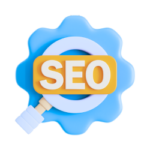What is Digital Marketing?
Digital marketing is the use of online platforms, tools, and strategies to promote products, services, or brands. It focuses on reaching and engaging people through digital channels like websites, social media, search engines, email, and mobile apps.
Unlike traditional marketing methods (like TV or print ads), digital marketing allows businesses to target specific audiences, measure performance in real-time, and adjust strategies quickly. It’s an effective way to connect with customers in today’s digital-first world.
When Was Digital Marketing First Used?
Digital marketing began in 1990, when the first search engine, Archie, was created to index FTP sites. However, the real turning point came in 1994, with the launch of the first clickable banner ad by AT&T on a website called HotWired. This marked the start of businesses advertising online to attract customers.
As the internet grew, so did digital marketing, evolving from simple banner ads to advanced techniques like email marketing, search engine optimization (SEO), and social media marketing.
Types of Digital Marketing
- Search Engine Optimization (SEO)
Optimizing your website to rank higher on search engines like Google, making it easier for people to find you. - Content Marketing
Creating and sharing valuable content, like blogs, videos, or infographics, to attract and engage your audience. - Social Media Marketing
Promoting your brand on platforms like Facebook, Instagram, Twitter, and LinkedIn to connect with your audience. - Email Marketing
Sending personalized emails to build relationships with customers, share updates, or promote products. - Pay-Per-Click (PPC) Advertising
Running paid ads on platforms like Google Ads or social media, where you pay each time someone clicks on your ad. - Affiliate Marketing
Partnering with individuals or websites (affiliates) who promote your products in exchange for a commission on sales. - Influencer Marketing
Collaborating with influencers who have a strong following to promote your brand or products. - Mobile Marketing
Engaging users through mobile apps, SMS, push notifications, or mobile-friendly ads. - Video Marketing
Using videos on platforms like YouTube, TikTok, or your website to connect with your audience and promote your brand. - Search Engine Marketing (SEM)
A broader strategy that includes both paid ads (PPC) and SEO to boost visibility on search engines.
Each type serves a different purpose, and businesses often combine several to create an effective digital marketing strategy.
Does Digital Marketing Actually Work?
Yes, digital marketing works—and it can be incredibly effective when done right. Here’s why:
- Wide Reach
Digital marketing lets you connect with a global audience. Billions of people use the internet daily, giving businesses access to a massive potential customer base. - Targeted Advertising
Unlike traditional marketing, digital platforms let you target specific groups based on age, location, interests, and behavior. This means your message reaches the right people. - Cost-Effective
Digital marketing is often more affordable than traditional methods like TV or print ads, and you can start small and scale up as you see results. - Measurable Results
With tools like Google Analytics and social media insights, you can track how well your campaigns perform and adjust them for better outcomes. - Engagement and Interaction
Digital marketing allows direct communication with your audience through comments, likes, shares, or messages, creating stronger customer relationships. - Proven Success
Businesses of all sizes, from startups to global corporations, have seen significant growth by leveraging digital marketing strategies.
However, success depends on factors like clear goals, a well-planned strategy, and consistent efforts. If done poorly, it might not yield the desired results.
How Much Does Digital Marketing Cost for an Online Store?
The cost of digital marketing depends on your goals, strategies, and budget. Here’s a general breakdown:
- Small Businesses or Startups
- Budget: $500–$5,000 per month.
- Focus: Social media ads, SEO basics, email campaigns.
- Medium-Sized Businesses
- Budget: $5,000–$20,000 per month.
- Focus: PPC ads, content marketing, and hiring experts or agencies.
- Large Businesses
- Budget: $20,000+ per month.
- Focus: Comprehensive strategies including influencer marketing, advanced analytics, and global reach.
What About Profit?
Profit depends on your business model, product pricing, and how well your marketing performs. A good digital marketing campaign typically delivers a Return on Investment (ROI) of 2x to 5x. For example:
- Spend: $1,000 on ads.
- Sales: $3,000–$5,000.
However, many factors affect this:
- Quality of your products.
- Target audience.
- Competitors in your niche.
- Optimization of your website and ads.
To maximize profit:
- Start small, test strategies, and track performance.
- Focus on high-ROI channels like SEO, email marketing, and retargeting ads.
- Constantly refine based on data and customer feedback.
With patience and the right approach, digital marketing can become a profitable investment for your online store.
Is Digital Marketing the Best Way to Expand a Business? Are There Other Options?
Digital marketing is one of the best ways to expand a business, especially in today’s online-driven world. However, it’s not the only option. Let’s break it down:
Why Digital Marketing Works Well
- Wide Reach: It connects you with a global audience.
- Cost-Effective: You can scale your budget as you grow.
- Measurable Results: Track performance and ROI in real-time.
- Targeted Marketing: Reach specific groups of people likely to buy your product.
- Customer Engagement: Build relationships through social media, email, and other platforms.
Other Ways to Expand Your Business
- Traditional Marketing
- Methods: TV ads, billboards, radio, flyers, events.
- Pros: Works well for local audiences or specific demographics.
- Cons: Can be costly and harder to track.
- Networking and Partnerships
- Building relationships with other businesses can lead to collaborations or new customer bases.
- Example: Cross-promotions, joint ventures, or affiliate programs.
- Referrals and Word-of-Mouth
- Encouraging happy customers to spread the word is powerful.
- Use referral programs or incentivize reviews.
- Expanding Product/Service Offerings
- Add new products or services that complement your existing ones.
- Test demand before launching.
- Franchising or Licensing
- If applicable, allow others to use your business model or brand in exchange for royalties.
- Entering New Markets
- Expand geographically by opening new stores or shipping to more regions.
- Adjust strategies based on local preferences.
- Improving Customer Experience
- Happy customers lead to repeat business and loyalty. Focus on excellent service, user-friendly websites, and fast delivery.
Best Approach? Combine Strategies
While digital marketing is essential, combining it with other methods can give your business a stronger foundation. For example:
- Use social media to build awareness.
- Host events or collaborate with local businesses to reach nearby audiences.
- Invest in customer service to turn buyers into loyal advocates.
The key is to align your strategies with your business goals and audience preferences.
Conclusion
Digital marketing has transformed how businesses grow in the digital age. It offers a cost-effective, measurable, and highly targeted way to reach a global audience. Whether you’re launching your online store or scaling your business, strategies like SEO, social media, and content marketing can drive significant results.
However, digital marketing isn’t the only path to success. Traditional methods, customer referrals, partnerships, and improving product offerings also play a vital role. The key is finding the right mix of strategies that align with your goals and audience.
With patience, consistency, and a focus on delivering value, digital marketing and other business growth strategies can help you expand and thrive in a competitive market.







